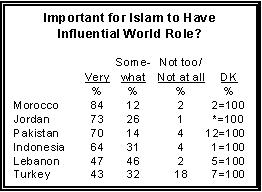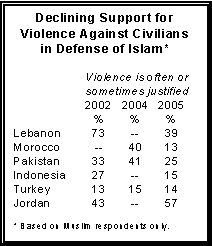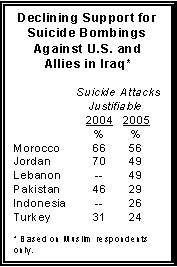 Large majorities of Muslims in most predominantly Muslim countries surveyed think that it is very important that Islam play a more important and influential role in the world than that religion now does. In Morocco, 84% of Muslims subscribe to this view, as do 73% in Jordan, 70% in Pakistan and 64% in Indonesia. Even in Lebanon and Turkey, where fewer among the Muslim population place high importance on a larger global role for Islam, pluralities in both countries do so.
Large majorities of Muslims in most predominantly Muslim countries surveyed think that it is very important that Islam play a more important and influential role in the world than that religion now does. In Morocco, 84% of Muslims subscribe to this view, as do 73% in Jordan, 70% in Pakistan and 64% in Indonesia. Even in Lebanon and Turkey, where fewer among the Muslim population place high importance on a larger global role for Islam, pluralities in both countries do so.
While many Muslims continue to see serious threats to Islam, in most predominantly Muslim countries surveyed those fears are declining. Concern remains very widespread in Jordan and Morocco where 82% and 72%, respectively, of the publics see Islam as facing serious threats. However, those levels are down significantly from the 97% and 79% levels recorded in May 2003. Similar declines in perceived threat since 2003 are found in Lebanon (down to 65% among Muslims from 73%), Pakistan (52% down from 64%) and Indonesia (46% down from 59%). Only in Turkey has concern among Muslims about threats to Islam increased since 2003, from 50% to 58% now.
Support for Islamic Terrorism
 Support for acts of terrorism in defense of Islam has declined dramatically among Muslims in most predominantly Muslim countries surveyed, although support has risen in Jordan. And while support for suicide bombings against Americans and other Westerners in Iraq remains at higher levels, it too has declined substantially among Muslim publics in all four countries with trend comparisons available, including Jordan.
Support for acts of terrorism in defense of Islam has declined dramatically among Muslims in most predominantly Muslim countries surveyed, although support has risen in Jordan. And while support for suicide bombings against Americans and other Westerners in Iraq remains at higher levels, it too has declined substantially among Muslim publics in all four countries with trend comparisons available, including Jordan.
In Turkey support for suicide bombing and other forms of violence against civilian targets in order to defend Islam from its enemies was already low compared to other majority-Muslim publics and has remained stable with just 14% of the public saying such actions are often or sometimes justified. In Indonesia only 15% now see terrorism as justified at least sometimes, down from 27% in summer 2002. In Pakistan, 25% now take that view, also a substantial decline from the 41% level to which support had risen in March 2004, while in Morocco support has fallen dramatically, from 40% to 13% over the last year.
In Lebanon, nearly four-in-ten Muslims (Christians and other religious groups were not asked this question) still regard acts of terrorism as often or sometimes justified, including 26% who see such acts as often justified. However, this is a sharp decline from 2002 when 73% thought these acts were often or sometimes justified. Moreover, when asked about suicide bombing against civilian targets in their own country, only 25% of Lebanese Muslims saw such violence as even sometimes justified.
Only in Jordan does a majority (57%) now say that suicide bombings and other attacks on civilians are sometimes or often justified and, unlike in other Muslim countries, that support has increased from 43% in 2002. However, as in Lebanon (but no other country), support for terrorist acts plummets when the question is confined to violence within Jordan itself, with less than one percent of respondents saying such acts are often justified and only 30% saying they are sometimes justified.
Having declined to relatively low levels in most predominantly Muslim countries surveyed, support for suicide bombing and other forms of violence against civilian targets shows little demographic variation. In Jordan, where support for terrorist tactics remains relatively high, income is the only significant factor, with those in the top income levels less likely to say that such acts are often or sometimes justified (45% in the top third of incomes say so compared with 67% of those with middle incomes and 59% in the lowest income range).
 Muslim publics are somewhat more inclined to support suicide bombings when carried out against Americans and other Westerners in Iraq, although here, too, the proportions considering such actions justifiable have declined over the last year.
Muslim publics are somewhat more inclined to support suicide bombings when carried out against Americans and other Westerners in Iraq, although here, too, the proportions considering such actions justifiable have declined over the last year.
Only in Morocco does a majority still find such bombings justifiable, although that percentage is down substantially from March 2004. In both Jordan and Lebanon, nearly half of Muslims support suicide bombings against Westerners in Iraq, but in Jordan such support has declined from 70% a year ago. In Turkey, Indonesia and Pakistan, fewer than three-in-ten now see such attacks as justifiable. In Morocco, Pakistan and Turkey, men are significantly more likely than women to find such actions justifiable.
As is the case with views of terrorist acts within their own country, higher-income people in Jordan are less likely to condone similar acts against Americans and their Western allies in Iraq, with only 41% in the highest bracket saying such suicide bombings are justifiable compared with 56% with middle incomes and 50% with the lowest incomes. And on this question, a nearly identical pattern is seen in Lebanon and in Turkey.
Osama bin Laden
The Muslim publics surveyed hold mixed views of Osama bin Laden. In Lebanon, only 2% report even some confidence in the Al Qaeda leader and in Turkey only 7% do so. In Morocco, just 26% now say they have a lot or some confidence in bin Laden, down from 49% two years ago.
 In Indonesia, the public is now about evenly split with 35% saying they place at least some confidence in bin Laden and 37% saying they have little or none, a major loss of confidence from the 58% to 36% split recorded in May 2003. Among Indonesians, confidence in the Al Qaeda leader is lower among older citizens but is higher among the more affluent. Among those ages 18-34, 39% express a lot or some confidence in bin Laden compared with less than a third of those 35 and over. However, while only 32% of people in the bottom income tier have confidence in bin Laden, 37% of middle-income and 42% of higher-income people do so.
In Indonesia, the public is now about evenly split with 35% saying they place at least some confidence in bin Laden and 37% saying they have little or none, a major loss of confidence from the 58% to 36% split recorded in May 2003. Among Indonesians, confidence in the Al Qaeda leader is lower among older citizens but is higher among the more affluent. Among those ages 18-34, 39% express a lot or some confidence in bin Laden compared with less than a third of those 35 and over. However, while only 32% of people in the bottom income tier have confidence in bin Laden, 37% of middle-income and 42% of higher-income people do so.
In only two countries, Pakistan and Jordan, has support for the Al Qaeda leader increased. In Pakistan, slightly more than half now place a lot or some confidence in bin Laden, an increase from the 45% who said so in 2003. Among Pakistanis, gender is a significant dividing line with nearly two-in-three men (65%) reporting a lot or some confidence in bin Laden, compared with 36% of women.
In Jordan, support for bin Laden has risen slightly, although the percentage saying they have a lot of confidence in him has declined to 25% from 38% in May 2003. In Jordan, both age and income patterns are the reverse of those in Indonesia: Confidence in bin Laden rises among older age groups — 56% of those under age 35 trust bin Laden compared with 64% of their older countrymen — and falls (as does support for terrorism generally) among higher income groups — 67% of the lowest-income Jordanians have confidence in bin Laden, compared with 63% of those with middle incomes and 47% of the highest income group.
In Turkey and Lebanon, the numbers expressing any degree of confidence in bin Laden are too low to reveal any significant demographic variations.
Voices
Reporting by the International Herald Tribune*
“I think people are starting to see the negative impacts of terrorism. People see that terrorism hurts our tourism industry and people will not come here if they are scared. People know we can’t fight violence with violence and Islam does not teach violence.”
– A 35-year-old newspaper salesman in Indonesia
“The Lebanese are known for being sympathetic to ‘jihad’ or resistance — not terrorism, there’s a difference — but with the series of bombings that has been happening in Lebanon, it has become more of a reality for people here. Innocent people are dying.”
– A Lebanese bank employee
“Pakistanis have experienced terrorism first hand in the last few years and that may have something to do with the decline in support for terrorism. Also, the state propaganda that eulogized militants fighting in Kashmir as freedom fighters has declined and the brutality of terrorism is now openly discussed in the Pakistani media. All this is clearly influencing Pakistani public opinion. [But] one must remember that public opinion changes. If people see excessive force being used against Muslim civilians in Iraq, Kashmir or Afghanistan, the pendulum may yet swing in the other direction.”
– A Pakistani professor and author now teaching in Boston
“People are less supportive of terrorist attacks because we know what terrorism does, we’re afraid of attacks.”
– A 55-year-old food stand vendor in Jakarta
*Interviews were conducted by Katrin Bennhold in France, Judy Dempsey in Germany, Salman Masood in Pakistan, Evelyn Rusli in Indonesia and Marlise Simons in the Netherlands, all of the International Herald Tribune and Mayssam Zaaroura in Lebanon of The Daily Star.


